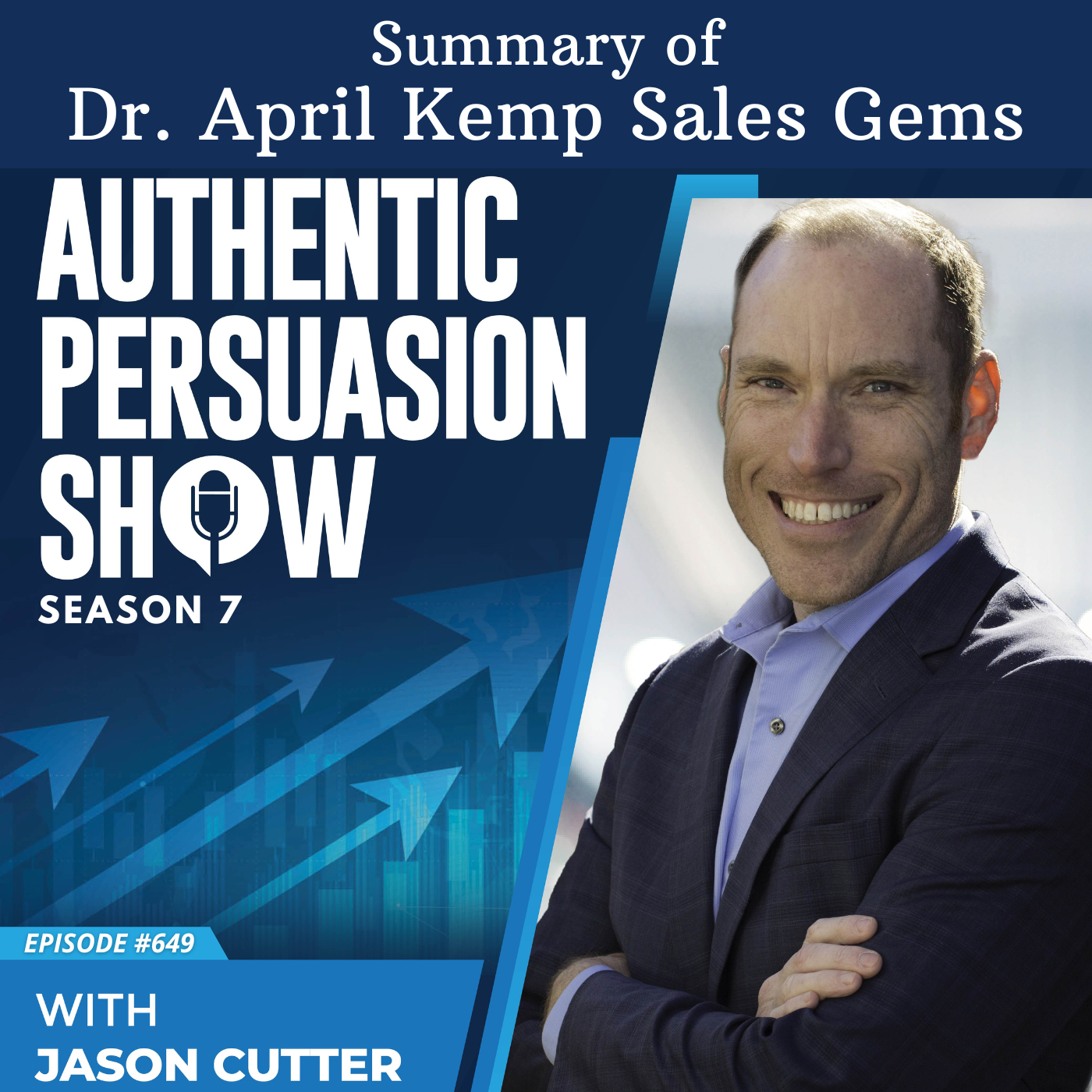Episode Transcript
It's not just about me selling him, not about me hitting my quota, not about me making my numbers, making my commission. None of that matters because all that Bob cares about is what's in it for him. And so that's how you go from nagging to successful followups, which is about them. Welcome to the sales experience podcast, the show for salespeople and sales leaders, where we help you create the ideal sales experience to generate raving fan customers.
Grab your notepad and get ready for actionable steps. You can use to change sales from a dirty word to an active service for your prospects. Now for your host, Jason Cutter.
I am so glad that you're here. I'm so glad that you're taking time to hopefully up a level your sales career or your sales team. By listening to podcasts like this, hopefully you've subscribed. If not, make sure to subscribe. And if you like this, leave a rating and a review. And in this episode, I am going to address some sales related questions to try to help everybody in sales do more, be more and sell more with their career and achieve their goals.
Now let's go ahead and jump into this episode. Deanna Russo sent me this. What's the difference between a friendly follow up with the client and nagging them for their business? How do you politely ensure that each client knows you're a top of mind or priority number one while still juggling the needs of others?
This is a great question. In this time right now and in any time in sales, this is one of those universal things. What's the difference between following up With a client and nagging them, there's a bunch of different things for this. And it's really the topic of a long conversation that we could have, but the top of mind things that come to me is to not be a nagging thing where you're following up with them.
You must be able to answer this one fundamental question about that prospect and every single one of your prospects in order to move that forward in the right way, which is why do they need your product or service? Why do they need your product or service is so fundamental. It's a ton of salespeople out there.
Most of the ones that I see that are operating more like an order taker where they don't know why the customer, why the prospect even needs what they're selling. So why do they even need it for their reasons? So what problem is it going to solve? What pain is it going to help them alleviate? What goal is it going to help them achieve?
Why do they want to do it for themselves, for the family, for their business, for the company, for their job? Whatever that is, why do they need it for them? Most salespeople, unfortunately don't care. And so they're not trained to care. They don't have a process that cares. Maybe they ask their questions, but at the end of it, they don't fundamentally know why that person needs it at the deepest level possible, which is really the key.
And so you want to make sure that you're doing your sales process the sales success fundamentals correct, and then in that when you're asking your questions is going as deep as possible so you can uncover why they need it for their reasons and not yours. Then what happens is with that information.
If for some reason you can't close it in one call or that's not how your sales process operates and you're doing that follow up, then when you're doing your follow up calls or your emails, you're making it relative to them. So let me give you an example. Okay. So let's say you're selling credit repair services.
And so what happens is somebody doesn't enroll today. You call them next week. Hey Bob, just following up, wanted to talk to you about your credit repair, that we need to get started on this, I know one of the big things when we talked last week is you told me that you really want to buy a house for you and your family and that's so important and that you're tired of renting and your goal is to be able to do that by next year and so we both agreed and we know that We're We've got to get your credit into a better place so that you can even qualify.
And so that's why it's important that we get the credit repair services started for you as soon as possible. And so I'm just calling to follow up to see if you grabbed your paperwork information so that we could get that process started, whatever that looks like for you. And so that's the key, right? So I'm making it about Bob.
And Bob's goal, Bob wants is he wants to buy a house for him and his family. They're renting, right? Maybe they live in a small apartment and nothing would make him happier than having a home. In order to do that, he needs better credit in order to get better credit. He needs me and my credit repair services.
And so that's what it's about. It's not just about me selling him. Not about me hitting my quota. Not about me making my numbers, making my commission. None of that matters because all that Bob cares about is what's in it for him. And so that's how you go from nagging to successful follow ups, which is about them.
Hey, you had said this was important to you. I want to help you with this. Is that still important to you? Is that still something you want to accomplish? Is this still something that would be valuable for you? Yes. Okay, sounds good. Let's get back on track and let's move forward. And so that's how you do it in my experience.
Because the thing is, and this is the second part of the question from Deanna was making sure the stays top of mind, right? Priority number one. Only way something is going to be priority number one is if it's going to help them accomplish something that's It's deep within them, right? It has some deep meaning.
It's some deep pain or some deep goal that they have that's the only way, right? So for example, there's a lot of people who talk about going to the gym, talk about eating healthy and working out every day, but it doesn't matter until it's something priority number one to them. And the only way to do that is to either.
Uncover that with them or have them identify why that's super important and what the difference would be in their life. And then it's easy, right? Because then you can bring that up. And a lot of times people are afraid I don't want to bring that up. I don't want to talk about that person's goal or what they're struggling with.
No, you should. If you're a salesperson, you're a professional, you should be talking about that more. You should bring that up. You should help them overcome their fear of change. and get them out of their comfort zone so they can accomplish something different in their life or in their job or at their company, whatever you're selling with your product or service.
And the best way to do that is to make sure they are staying true and in line with what it is that they told you they wanted. So hopefully that helps. Thanks Deanna Russo for the question. I appreciate it. Hey, it's Jason here. We'll be right back to the podcast, but first, are you ready to change the way you view your selling role and become a sales professional?
Do you have a team that is hungry for new ways to improve and grow? If so, I have various coaching and consulting programs available. That might be great tools to help you achieve your goals to learn more about the ways we can work together and to book your free sales power call, go to Jason cutter. com.
Now let's get back to the episode. So this one comes from Dominique miles. And the question is, I think time management is a huge part of being successful in sales. Can you give an in depth solution for managing time better? All right. This one is a very big deal. I see this so much as an issue in sales and in life.
And so I'm going to handle this in two different parts. The first one is going to be actual tactical stuff. The second one is going to be mindset. So So The first part of this question that I see is the tactical side, the practical side, like what you can actually do in a moment. And I think the big key is if we use this visualization that you might've heard of before, is if you had a big pile of rocks, if you had a whole bunch of rocks going from boulders down to sand and pebbles and you want to put it into a bucket, there is a best way to do that in order to get everything to fit.
If you put in the sand first and then you put in the bigger rocks after. What happens is they sit up on top and it's not going to fill in the space effectively and it might not all fit. However, if you take the big rocks and you put them into the bucket first, and then you put in the medium sized rock second, and then you put in the sand third, everything will fill in the gaps in between it.
And then you'll have this very dense packed bucket full of rocks. Same thing happens with time management and your prioritization. In your sales career in your day. And so what you want to do is you want to analyze everything that you have to do, everything that you want to do to be successful in sales and look at those in terms of those rocks at the big rocks being actual sales conversations, talking to prospects, doing demos or phone calls or meetings, whatever that looks like for what you sell.
It's the prospecting. It's that outbound. It's the networking. It's also meetings that you have with manager. to get feedback and things to help you. It's training. It's those items there. Those are the big rocks that you want to make sure to fill in on your schedule every day as far as the priorities. So put those in first.
Then in between those would come the other items. So that would be things like other prospecting, other outreach, researching accounts or customers or people that you're wanting to focus on for your prospecting, for your conversations. It's prepping for those meetings and those conversations. And so those are the smaller things.
That's what you want to fill in the gaps with in order to be focusing on the right things at the right times. So make sure to prioritize based on the value of what that's going to be. A lot of times what I see is people are focusing on the small things instead of the big things. So they're doing a lot of research.
They're doing a lot of responding to messages or things that are falling more under procrastination and not high value items instead of what's really high value. So that's the first part. The second part, let's talk about mindset. When it comes to mindset, it's really a question about what do you want to accomplish and why, which I've talked about before.
But the key is when we're talking about time management, it's what's getting in your way. Why aren't you managing your time better? And again, it's not about managing time. It's about priorities. and what are you focused on? And do you want to be successful? Generally, what happens when people are having issues managing their time and their priorities?
It's because their mindset isn't quite focused where they want it to be. And generally it's because there's some level of fear or procrastination that's kicking in, right? So that fear, that procrastination is causing people to focus on the. easy things and or the wrong things for success relative to what they could be doing and what would get them the, their goals right to where you want to be in sales.
And so the key is if you're finding yourself struggling with time management, which is really an issue with prioritization, then it's a matter of probably procrastination. And then what is your mindset? What are you afraid of? What are you worried about? And so that's something to make sure you dive in and tackle because.
None of the other stuff is going to matter. None of the tactics, none of that big boulder conversation will matter unless you have the mindset, right? And then the last part that I always recommend to people outside of all this is to take your annual income goals. So whatever that looks like for the year, whether it's bonus, it's commissions, it's base salary.
It's everything that you want to make in a year and then break that down into an hourly rate and or a minute to minute rate. So take number of hours you work in a week, number of weeks per year, break that down, break it down by minute. If you want to post that up on your computer, on your phone, in front of you, maybe on your phone as well as the background.
And then that will be a great reminder to you of constantly focusing on what you're doing in the moment. And is that helping you get to where you need to be if you're chatting a lot or procrastinating a lot or playing online social media, endless researching analysis, paralysis and just spinning your wheels is that actually helping you get to that 30 an hour, 50, 100, 200, 300 dollar an hour mark. And if it's not, then how can you stop that and focus on the other things that matter the most? So hopefully that helps. Thank you for this question. Dominique, are you looking for a way to increase your selling effectiveness? Breakthrough plateaus and achieve your financial goals through sales.
When you use the authentic persuasion method, you will transform from order taker to quota breaker. If you're ready to become an authentic persuader, go to Jason cutter. com to download the free ebook. And if you want to get help on getting there even quicker for yourself or your sales team, set up your free sales power call, and I will give you some tips and strategies to help in your conversations.
And also make recommendations on ways that we can work together. When you're ready, go to Jason cutter. com again, Jason cutter. com. You can find all the links you need at Jason cutter. com and also set up your free sales power call. And no matter what, keep in mind that everything in life is sales and people remember the experience you gave them.
![[E224] Proper follow-up or nagging? (Q&A)](https://episodes.castos.com/salesexperiencepodcast/images/TSEP-Cover-APQA.png)


